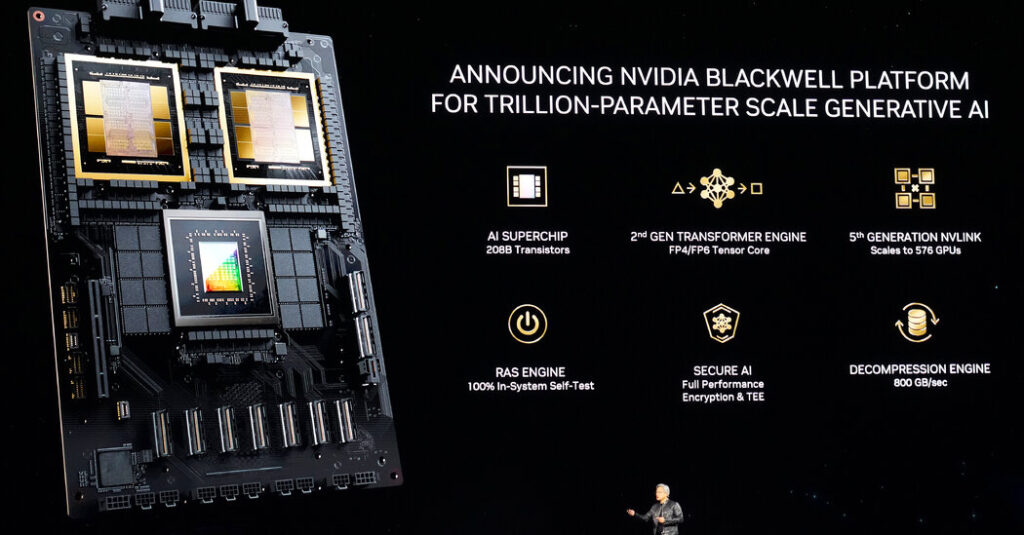Nvidia, which makes the microchips that power most artificial intelligence applications, began an extraordinary run a year ago.
Fueled by an explosion of interest in AI, the Silicon Valley company said last May that it expected its chip sales to go through the roof. They did — and the excitement hasn't died down, with Nvidia raising its revenue estimates every few months. Its stock soared, leading the company to a market capitalization of more than $2 trillion, making it more valuable than Google's parent Alphabet.
On Wednesday, Nvidia once again reported rising revenue and profits that underscored how it is a dominant winner of the AI boom, even as it faces high expectations and growing competition.
Revenue for the three months ended in April was $26 billion, beating its estimate of $24 billion in February and tripling sales from a year earlier for the third straight quarter. Net income rose sevenfold to $5.98 billion.
Nvidia also projected revenue of $28 billion for the current quarter ending in July, more than double the amount from a year ago and above Wall Street estimates.
“We're ready for our next wave of growth,” Nvidia Chief Executive Jensen Huang said in a statement.
A doubling rather than a tripling of revenue would reflect the way skyrocketing sales of AI chips began to transform Nvidia's results a year ago. Those growth rates are now expected to slow as the initial ramp-up makes year-over-year comparisons tougher.
Shares of Nvidia, up more than 90 percent this year, rose in after-hours trading after the results were released. The company also announced a 1-for-10 stock split.
Nvidia, which originally sold chips to render images in video games, has benefited after making an early, expensive bet on its graphics processing units, or GPUs, to perform other computing tasks. When AI researchers began using these chips more than a decade ago to speed up tasks such as recognizing objects in images, Mr. Huang jumped at the chance. It leveraged Nvidia's chips for AI tasks and developed software to help advance the field.
The company's flagship processor, the H100, has enjoyed strong demand for powering AI chatbots such as OpenAI's ChatGPT. While most high-end standard processors cost a few thousand dollars, the H100s have sold for $15,000 to $40,000 each, depending on volume and other factors, analysts said.
Analysts are debating the potential impact of the H100's powerful successor, codenamed Blackwell, which was announced in March and is expected to begin appearing in early models in the fall.
Demand for the new chips already appears strong, raising the possibility that some consumers may wait for the fastest models instead of buying the H100. But Nvidia's latest results showed no sign of such a pause.
Wall Street analysts are also looking for signs that some well-funded rivals could grab a significant chunk of Nvidia's business. Microsoft, Meta, Google and Amazon have all developed their own chips that can be tailored for AI jobs, though they have also said they are increasing purchases of Nvidia chips.
Traditional rivals such as Advanced Micro Devices and Intel have also made optimistic predictions about their AI chips. AMD has said it expects to sell a new AI processor, the MI300, worth $4 billion this year.
Mr. Huang often points to what he says is an enduring advantage: Only Nvidia's GPUs are offered by all major cloud services, such as Amazon Web Services and Microsoft Azure, so users No need to worry about being locked out of using one. of services due to its special chip technology.
Nvidia is also popular with computer makers who have long used its chips in their systems. One is Dell Technologies, which hosted an event in Las Vegas on Monday featuring Mr. Huang.
Michael Dell, Dell's chief executive and founder, said his company would offer new data center systems that would pack 72 new Blackwell chips into computer racks, standard structures slightly taller than a refrigerator.
“Don't tempt me with such things,” joked Mr. Huang. “It makes me so excited.”
